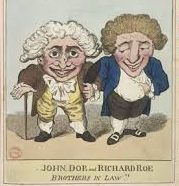In Lewis v. Crochet, the Fifth Circuit found that a ruling about the attorney-client privilege was properly appealed under the “collateral order” doctrine, applying Mohawk Indus. v. Carpenter, 558 U.S. 100, 103 (2009).
Category Archives: Privilege – Attorney/Client
Two rulings about the crime-fraud exception to the attorney-client privilege were recently reversed, by both the Fifth Circuit and Dallas’s Fifth District, in response to mandamus petitions. (This is a cross-post with 600commerce.com.)
- In the Fifth Circuit: “[A]s Boeing argues, the district court clearly erred in finding that Plaintiffs established a prima facie case that the contested documents were subject to the crime-fraud exception. The district court concluded that the contested documents were reasonably connected to the fraud based on one finding only—that the documents sought ‘f[e]ll within the period Boeing admit to hav[ing] knowingly and intentionally committed “fraud” in the DPA. However, a temporal nexus between the contested documents and the fraudulent activity alone is insufficient to satisfy the second element for a prima facie showing that the crime-fraud exception applies.” In re The Boeing Co., No. 21-40190 (July 29, 2021, unpublished).
- In the Fifth District, the Court noted: “[A] determination at the TCPA stage as to a prima facie showing does not automatically translate to a prima facie showing for purposes of application of the crime–fraud exception to the attorney–client privilege. The exception UDF attempts to invoke is for crime–fraud, not crime–tort.” From there, it declined to follow a broad view of the exception defined by another Texas intermediate court, “and note that, notwithstanding certain language in the [relevant] opinion, the El Paso court continues to apply the elements of common-law fraud when determining the applicability of the crime fraud exception, rather than requiring proof of a false statement only.” In re Bass, No. 05-21-00102-CV (July 30, 2021) (mem. op.).
In In re Schlumberger Tech, Inc., the Fifth Circuit again held that mandamus relief can be necessary to remedy the erroneous production of privileged material. It found that no offensive-use waiver occurred when: “STC’s answer claimed only that it relied in good faith ‘on applicable law, administrative regulations, orders, interpretations and/or administrative practice or policy enforcement.’ STC did not claim that counsel advised it that its decisions complied with the FLSA. Indeed, its answer did not allude to advice of counsel at all. While privileged communications may have some bearing on STC’s beliefs about its compliance, STC has not ‘rel[ied] on attorney-client communications’ to establish its good-faith defense.” No. 20-30236 (June 4, 2020).
 The Fifth Circuit allowed a “John Doe” summons to proceed, requiring a law firm to disclose certain client entities. After reviewing authority nationwide about such warrants, the Court concluded: “[D]isclosure of the Does’ identities would inform the IRS that the Does participated in at least one of the numerous transactions described in the John Doe summons issued to the Firm, but ‘[i]t is less than clear . . . as to what motive, or other confidential communication of [legal] advice, can be inferred from that information alone.’ Consequently, the Firm’s clients’ identities are not ‘connected inextricably with a privileged communication,’ and, therefore, the ‘narrow exception’ to the general rule that client identities are not protected by the attorney-client privilege is inapplicable.” Taylor Lohmeyer Law Firm PLLC v. United States, No. 19-50506 (April 24, 2020).
The Fifth Circuit allowed a “John Doe” summons to proceed, requiring a law firm to disclose certain client entities. After reviewing authority nationwide about such warrants, the Court concluded: “[D]isclosure of the Does’ identities would inform the IRS that the Does participated in at least one of the numerous transactions described in the John Doe summons issued to the Firm, but ‘[i]t is less than clear . . . as to what motive, or other confidential communication of [legal] advice, can be inferred from that information alone.’ Consequently, the Firm’s clients’ identities are not ‘connected inextricably with a privileged communication,’ and, therefore, the ‘narrow exception’ to the general rule that client identities are not protected by the attorney-client privilege is inapplicable.” Taylor Lohmeyer Law Firm PLLC v. United States, No. 19-50506 (April 24, 2020).
 In In re City of Houston, the Fifth Circuit succinctly held: “Having reviewed the submissions of the parties, the documents in dispute, which are contained in Exhibit A to the City’s motion to seal documents, and pertinent jurisprudence, we conclude that the electronic communications identified by the City in Tabs 3, 4, 5, 8 and 9 of Exhibit A fall within the attorney-client privilege and that mandamus relief is warranted with respect to such items. See In re: Itron, Inc.,883 F.3d 553, 567–69 (5th Cir. 2018); EEOC v. BDO USA L.L.P., 876 F.3d 690, 695-97 (5th Cir. 2017); Exxon Mobil Corp. v. Hill, 751 F.3d 379, 382–83 (5th Cir. 2014); In re: Avantel, S.A., 343 F.3d 311, 316–17 (5th Cir. 2003).” No. 19-20377 (June 18, 2019, unpublished).
In In re City of Houston, the Fifth Circuit succinctly held: “Having reviewed the submissions of the parties, the documents in dispute, which are contained in Exhibit A to the City’s motion to seal documents, and pertinent jurisprudence, we conclude that the electronic communications identified by the City in Tabs 3, 4, 5, 8 and 9 of Exhibit A fall within the attorney-client privilege and that mandamus relief is warranted with respect to such items. See In re: Itron, Inc.,883 F.3d 553, 567–69 (5th Cir. 2018); EEOC v. BDO USA L.L.P., 876 F.3d 690, 695-97 (5th Cir. 2017); Exxon Mobil Corp. v. Hill, 751 F.3d 379, 382–83 (5th Cir. 2014); In re: Avantel, S.A., 343 F.3d 311, 316–17 (5th Cir. 2003).” No. 19-20377 (June 18, 2019, unpublished).
 At a recent energy law seminar for the University of Texas, My colleagues Michael Hurst, Jonathan Childers, and Jervonne Newsome presented this excellent paper on the important and recurring topic of maintaining attorney-client privilege in communications involving in-house counsel – a constant challenge given the many hats worn by legal counsel in the modern business environment.
At a recent energy law seminar for the University of Texas, My colleagues Michael Hurst, Jonathan Childers, and Jervonne Newsome presented this excellent paper on the important and recurring topic of maintaining attorney-client privilege in communications involving in-house counsel – a constant challenge given the many hats worn by legal counsel in the modern business environment.
 “Not all errors are correctable on mandamus. This one, however is.” In the case of In re: Itron, the Fifth Circuit granted mandamus relief as to a finding of an extensive waiver of attorney-client privilege, reasoning:
“Not all errors are correctable on mandamus. This one, however is.” In the case of In re: Itron, the Fifth Circuit granted mandamus relief as to a finding of an extensive waiver of attorney-client privilege, reasoning:
- Itron showed the “inadequacy of relief by other means” as to the erroneous disclosure of privileged documents, especially since it had “exhausted every other opportunity for interlocutory review of the magistrate judge”s order compellig production”;
- Itron established a clear abuse of discretion: “[T]he magistrate judge failed to apply Mississippi”s Jackson Medical test for waiver, and misapplied even the broad, erroneous waiver test Defendants urge instead. . . . [B]oth aspects of this error are obvious and purely legal in nature.”; and
- “[C]orrecting this error is a proper exercise of our discretion,” noting “the issue’s ‘importance beyond the immediate case'” in other disputes about privilege, as “more district courts could mistakenly find waiver whenever attorney-client communications would be relevant.”
A dissent said that a clear abuse of discretion had not been established. This opinion does not reflect any sea change in the Fifth Circuit’s willingness to grant mandamus relief, but it does show that even a court reluctant to grant such relief will do so in a compelling case (indeed, the panel majority opinion is written by Judge Higginson, who dissented from the panel opinion and subsequent denial of en banc review in In re: Radmax, 720 F.3d 285 (5th Cir. 2013).
 The Fifth Circuit recently “walked back” its May opinion in EEOC v. BDO USA, which identified three problems with a privilege log. A revised opinion removed that discussion, in favor of a shorter, more general observation about there being “no presumption that a company’s communications with counsel are privileged.” The new opinion observed: “Given the ‘broad’ and ‘considerable discretion’ district courts have in discovery matters, we will not analyze the privilege logs in the first instance.” EEOC v. BDO USA, No. 16-20314 (revised Nov. 16, 2017).
The Fifth Circuit recently “walked back” its May opinion in EEOC v. BDO USA, which identified three problems with a privilege log. A revised opinion removed that discussion, in favor of a shorter, more general observation about there being “no presumption that a company’s communications with counsel are privileged.” The new opinion observed: “Given the ‘broad’ and ‘considerable discretion’ district courts have in discovery matters, we will not analyze the privilege logs in the first instance.” EEOC v. BDO USA, No. 16-20314 (revised Nov. 16, 2017).
 Document logs are a necessary, if unloved, feature of privilege disputes. A privilege log is inherently difficult to create, since it must describe the relevant documents but not reveal the privileged information in them. And because a log often lists many documents on the same subject, it can quickly become dull and repetitive. But proper preparation of a log is key to litigating about privilege, as the Fifth Circuit recently held in EEOC v. BDO Seidman LLP when it rejected the sufficiency of the defendant’s log in an employment case. No. 16-20314 (May 4, 2017). The opinion provides four practical tips for attorneys involved in privilege disputes.
Document logs are a necessary, if unloved, feature of privilege disputes. A privilege log is inherently difficult to create, since it must describe the relevant documents but not reveal the privileged information in them. And because a log often lists many documents on the same subject, it can quickly become dull and repetitive. But proper preparation of a log is key to litigating about privilege, as the Fifth Circuit recently held in EEOC v. BDO Seidman LLP when it rejected the sufficiency of the defendant’s log in an employment case. No. 16-20314 (May 4, 2017). The opinion provides four practical tips for attorneys involved in privilege disputes.
 The case began when Hang Bower, a former HR manager at BDO Seidman, alleged that she had been subjected to gender discrimination. In response to an EEOC subpoena, BDO prepared a privilege log listing 278 documents. The EEOC filed an enforcement action in federal court, offering a declaration from Bower in support. In it, she said that many of the communications “were made for the primary purpose of conveying business directives or factual information.” She also said that “BDO required her . . . to include in HR-related emails a false designation that the communication was prepared ‘at the request of legal counsel.’”
The case began when Hang Bower, a former HR manager at BDO Seidman, alleged that she had been subjected to gender discrimination. In response to an EEOC subpoena, BDO prepared a privilege log listing 278 documents. The EEOC filed an enforcement action in federal court, offering a declaration from Bower in support. In it, she said that many of the communications “were made for the primary purpose of conveying business directives or factual information.” She also said that “BDO required her . . . to include in HR-related emails a false designation that the communication was prepared ‘at the request of legal counsel.’”
The magistrate judge found that BDO’s log was adequate, declined to do an in camera review of the documents, and denied relief to the EEOC. The district judge affirmed and the Fifth Circuit reversed, identifying four particular areas of concern:
- Substance. “[N]umerous log entries fail to identify a sender, recipient, date, or provide a substantive description of the subject matter . . . [s]ome entries have only vague descriptions such as ‘discrimination claim,’ ‘internal investigation,’ or ‘work environment claim’”
- Email chains. “Emails involving counsel are also problematic, as the log’s descriptions do not indicate whether a particular entry consists of one email or a string of emails – a distinction that may be dispositive as to whether the privilege applies.”
- Business/Legal distinction. “[N]ot only does the log include conclusory descriptions of ‘legal advice,’ it does so in the context of communications with in-house counsel – an area court have acknowledged presents unique challenges . . . further compounded where HR personnel, such as Bower, are involved.” The Court noted the issues raised in Bower’s declaration.
- Disclosure. “[T]he log leaves open questions about (1) whether emails courtesy copied to a third party remained privileged . . . (2) whether matters communicated to attorneys were done so with the intention of remaining privileged . . . and (3) whether non-attorney individuals to whom communications were sent were within the sphere of confidence . . . .”
Because the log lacked sufficient detail to establish BDO’s prima facie case of attorney-client privilege as to all the entries, the Fifth Circuit found that the magistrate judge’s legal analysis was flawed and remanded. The Court observed: “Although we leave to the district court’s discretion how to proceed on remand, we note that in camera review will likely be necessary given the facts and circumstances of this case.”
In addition to reminding about four key components of a good privilege log, this opinion reinforces the importance of evidence in resolving a privilege dispute. Bower’s declaration raised questions about the information in the log, which could not be resolved by the log entries themselves. Counsel preparing a privilege log thus needs to not only consider the completeness of the log entries, but how those entries will be supported by evidence and in camera review if there are further proceedings.
 Michael Swoboda sued Continental Enterprises, claiming that it conducted an investigation into alleged trademark infringement led to his wrongful discharge. He sought the production of documents that Continental alleged were protected as work product. The district court allowed the discovery and denied the intervention by Heckler & Koch, the gunmaker whose rights about the G36 submachine gun (above) were at issue and had retained Continental.
Michael Swoboda sued Continental Enterprises, claiming that it conducted an investigation into alleged trademark infringement led to his wrongful discharge. He sought the production of documents that Continental alleged were protected as work product. The district court allowed the discovery and denied the intervention by Heckler & Koch, the gunmaker whose rights about the G36 submachine gun (above) were at issue and had retained Continental.
The Fifth Circuit reversed, holding: “Continental’s work product privilege argument was overruled because Continental is a company that engages in investigative work, and the district court concluded that the discovery that Swoboda sought was produced in Continental’s ordinary course of business, i.e., in the course of a Continental investigation. HK is a gun manufacturer. Investigations are not a part of HK’s ordinary course of business. Some of the discovery that Swoboda sought was, from HK’s perspective, prepared in anticipation of litigation. We have held that an applicant-intervenor should be allowed to intervene when it ‘has a defense not available to the present defendant.’ HK has a defense unavailable to Continental, and it should have been allowed to present that defense in the district court.” Swoboda v. Manders, No. 16-30074 (Oct. 31, 2016, unpublished).
The owners of a self-storage company sued Morgan Stanley, alleging that it mishandled the negotiation of substantial insurance claims arising from Hurricane Katrina. An issue on appeal was whether, under federal common law, a communication between the company’s corporate counsel to Morgan Stanley was privileged. The Fifth Circuit noted that while “[s]everal courts — including lower courts in this circuit — have held that the [common interest] privilege extends to co-plaintiffs in litigation,” “this court has not expressly held that the privilege is inapplicable to co-plaintiffs. The Court did not need to address that issue, however, because it found that this communication was not made to “further a joint or common interest.” (emphasis in original) BCR Safeguard Holding, LLC v. Morgan Stanley Real Estate Advisor, Inc., No. 14-31068 (June 2, 2015, unpublished).
Legal advice or business discussion? This question is the key issue in most privilege disputes about in-house counsel. The Fifth Circuit addressed that question and offers practical guidance for in-house counsel in Exxon Mobil Corp. v. Hill, No. 13-30830 (May 6, 2014).
ExxonMobil intervened in tort litigation to contend that the attorney-client privilege protected a short 1988 memo by an in-house lawyer. The lawyer created the memo during negotiations between Exxon Mobil and ITCO, a company that would store oil production equipment for it. The memo recommended that Exxon Mobil, in response to an information request by ITCO, make a limited disclosure from a report it had about radioactivity associated with the equipment. As the Fifth Circuit summarized: “Stein [the lawyer] suggested that Guidry [the client] disclose only Table IV [of the report], because it contained the only data that ITCO specifically had requested, and that Guidry remove the caption ‘Table IV’ so as not to flag the existence of other tables.” (The memo identifies the sender as “Counsel,” but does not otherwise say that the contents are privileged.)
Plaintiffs contended that the effect of this advice was to conceal information about dangerous levels of radiation. The district court opinion [page 61 of the attached] rejected ExxonMobil’s position about privilege, reasoning that it had not shown that the “primary or predominant” purpose for consultation with the lawyer was for legal advice, “particularly in light of the fact that the [memo] itself does not contain any reference to a legal justification for Stein’s advice, or legal concerns prompting Guidry to seek such advice. . . . [I]t appears from the face of the document that the primary purpose of Stein’s advice to Guidry was to help secure more favorable contract terms . . . .”
The Fifth Circuit reversed. Stating that its conclusion would be the same under de novo or clear error review, the Court held: “The manifest purpose of the draft [attached to the memo] was to deal with what would be the obvious reason Exxon Mobil would seek its lawyer’s advice in the first place, namely to deal with any legal liability that may stem from under-disclosure of data, hedged against any liability that may occur from any implied warranties during complex negotiations.”
This opinion offers practical guidance for maintaining privilege as to in-house counsel. First, the memo is focused. Written in 1988, before long email chains became common, it presents a short exchange on a specific topic. Second, it has a specific audience — it is written to a specific person rather than a large group — or a “reply all.” Finally, it is clear. The memo refers directly to legal concepts such as warranty liability and property interests. The memo’s focus, audience, and clarity appear to have been critical for the Court’s analysis and the preservation of Exxon Mobil’s privilege with its in-house counsel.